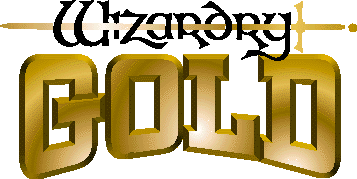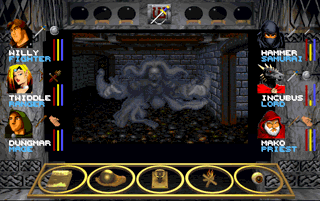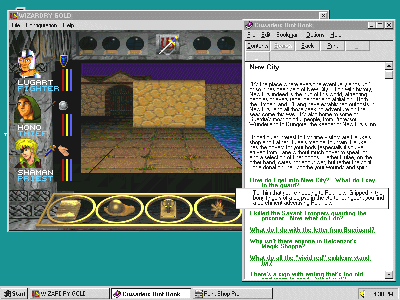

History: Back at the beginning of recorded time, a small company was founded, a game was produced, and sold. The sales were from the trunk of a car to the individual owners of computer software stores. (Yes, Virginia, there was a time when computer stores were owned and operated by entrepreneurs, but that is another story. - Ed.) Out of the trunk came hundreds of thousands of high quality cardboard boxes covered with black foil embossed with red and gold lettering that announced a phenomenon, Wizardry: Proving Grounds of the Mad Overlord.
Discovery of this game gem, created a new generation of gamer - people often huddled over their small micro computer consoles late into the night until the sun rose from above their monitors. Industry analysts have attributed the sales of the Apple II computer to a spreadsheet program called VisiCalc which later lost out the leaderboard position to Lotus 1-2-3 on the IBM, but those who know the truth, know that Wizardry sold more computers than any business application, with over five years the game dominated the top five selling games in the world.
Behind this phenomenon lies a father who succeeded in developing his own
business in the northern New York State town of Ogdensburg, and two sons
and their school chums (Robert "Trebor" Woodhead and Andrew "Werdna"
Greenberg), with a spark of an idea. An idea that eventually grew into
an empire, which has produced some of the greatest games to grace a
computer. And while many may look back on these early efforts with
disdain, they are missing the point. Much of what happened in those
days was in stimulating the imagination rather than burning out eye
sockets with colors and dancing sprites.

Many could learn volumes from the history of this most successful pioneer in game development. The hits and misses that the game experimented with even extended into accounting, with the Clan Practical Accountant. The road has been rocky but the overall trend for the company and products has been up the mountain and not down.
The Plot: Wizardy has always had an undercurrent of some one or some thing beyond the motif of fantasy gaming controlling things. The hint of the mind behind the mayhem, was first witnessed on the fourth floor, computerized monster allocation center in the Proving grounds. Here monsters may have been created and distributed to various locations within the maze. Was this area controlled by the final wizard down at the end of the chute on the lower level or was this area controlled by a higher power.
There is a secret planet called "Lost Guardia." The planet has become the site of a great treasure hunt for the power of the universe contained on the Astral Dominae artifact and life itself as hidden here by the great Phoonzang - or so says the legend. Many are on the planet seeking the secret, including the game namesake, the Dark Savant. The Astral Dominae is within a tomb, the path to which winds through forests, mazes of all types, dungeons, mountains, and towns.
Gameplay: Competing non player character (NPC) groups, Races that are either allied or in conflict, and starting points that depend on where you got in the previous installment (Wizardry VI, Bane of the Cosmic Forge) provide a unique and innovative game concept. A starter dungeon helps new players get used to the game play and trains them in combat and strategy. Exploration and combat is in first person perspective view of the world, in the tradition that started with the first Wizardry adventure in 1978.
The game play is totally free form and non-linear, four different end games may result from your actions, and not simply dead or successful outcomes. You travel with a party of six different characters, each with their own powers, profession, magic spells and resistance, martial arts, sex, characteristics or attributes, and skills. These skills increase with experience gleaned in combat or by successful completion of quests.
Interface: Point and click replaces the typing of the names of arcane spells or the use of the attack key or A in battle. But in many cases traversing the mouse laden menus is more cumbersome than remembering and typing the names of spells and using hot key combinations. Perhaps this points to the possibility that game designers retain an optional command line driven interface where the mouse one proves possibly cumbersome for those who know how to type.
Selecting one of the six player characters is as easy as clicking on their pictures, but the use of number codes would save time for many game players. Adventuring with a party of adventurers is more fun than going it alone, even if the party is composed of a group of player controlled artificial intelligences. Perhaps in the future others will be able to satisfy our craving for traveling with a party of adventurers rather than just alone.
Upgrade?: D. W. Bradley crafted "Crusaders of the Dark Savant" into the Wizardry universe, resulting in the Wizardry 7 game which was released in 1992. Wizardry Gold is the conversion of the original game into the Windows platform, to make it accessible to the new Windows 95 users and those who prefer to play on Windows NT or 3.11. The new version is also available for Macintosh owners, ending the four year hiatus to convert to that platform.
Combat: First person perspective, rounded, turn-based or phased combat makes the game more of a strategic venture than the twitch action games of Doom and others with real-time combat. The tone is deliberate and studied. Unfortunately, the game does not allow you to concentrate your fire on one monster group or type, which is a great problem for those of us who like that level of control. Combat weaponís damage has been reported to be different in the Windows 95 version of the game.
Combat difficulty increases as characters gain in levels, skills, and
experience, which is a dangerous proposition. The increase has been
handled with finesse to avoid the disaster of having no advantage and
even a possible disadvantage to character development, as seen in such
classics as Might and Magic II. Combat text speed problems have been
addressed in an available patch, but the patch does little to fix the
problem.

Character generation: A party of canned characters saves time getting started, but retains the more complex custom character generation schemes for those who enjoy rolling their own. Still lacking is the edit feature pioneered by Strategic Simulations which allows the game player to set the statistics to other favorite role playing characters developed and played with in other computer based games, and pen and paper games.
Magic: The intuitive and logical magic system has over 90 spells divided into six disciplines of earth, air, fire, water, mental and divine magic. Spells have adjustable power levels. Sound effects make the spells more dramatic with iceballs, acid bomb and the blast of all blasts, the fireball.
Puzzles: In true treasure hunt fashion, game players look for maps to other areas, weapons, armor, and other artifacts. Competing races of intelligent non-player characters (NPCs) sets this game apart from many previous games. If you get to a location too late, after another group of NPCs, you may have to go seek them out to get an essential artifact or other information by barter or combat.
Graphics: Play the game in 256-color, 640x480 pixel resolution or 800x600 pixels
Animation: Cinematic sequences which form the new introduction and endgame, and monster animation in combat are a few of the new features to this classic game. The animations are not as technologically advanced as those seen in many other games in the four years since this gameís first introduction. Those who wish to play the classics without a hitch, either must keep a working copy of an old computer or purchase these upgrades required by operating system "advances" like Windows 95.
Blue and red magic missiles, explosions, and animations of air and water in the spell areas are quite clever and entertaining.
Difficulty: One can set the difficulty level regulating the number of monsters you run into while playing.
Voice actors: Professionally recorded, digitized speech during combat really makes this product more fun than the original. Talking NPCs and game narration give each character a personality and add to the illusion of reality. Narrated passages are also displayed in readable text on the screen for the hearing impaired or simply for those who wish to read along while they listen - which is a favorite of mine.
Sound effects: Sound effects are also now digitized and are heard during combat for a new sensation. The sounds have been enhanced to make more effect with clashing of swords, crackles and whooshing sounds.
Music score: A new music score, a MIDI soundtrack, was created just for the game, creating different moods for different parts of the game.
Hint book, online map, and Help is now available while playing the game, making the game easier and simpler to just take out of the box and get started. While many may wish to challenge the game on their own, others prefer to find the answers to the puzzles that stump them quickly in order to get on with the story. The incorporation of the help, albeit not-context sensitive help, with the plot and the game mechanics is a laudable feature.
Utilities include Wizardry sound bits, screen savers, and wallpaper to amuse, confound and baffle those in close proximity to the workstation.
Multiplayer: With a party of six advernturers against the world, I would have thought that cooperative network play would have been an easy thing to implement. Each party could have a leader and all could play on the same network or through the phone lines to the internet or other player or with a null modem. But Sirtech did not implement any multiplayer features. Many online games use this concept of a leader and the rest of the party goes along for the fight, and it would have been a good enhancement.
Cheat: Download a party of super adventurers in file WGELCHR.ZIP from Compuserve Gamerís Forum (Go Gamers).
Reviewers: Relative newcomer Petra Schlunk takes on the task for Computer Player and gives the classic upgraded to Windows 95 an award (Computer Player Recommended). Petra uses words like neat and awesome. By the way, rolling characters is always a tedious, but necessary process if you adhere to standard role playing rules.
References:
Andy Backer, www.cdmag.com/adventure_vault/wizardry_gols_review/page1.html, Computer Games Strategy Plus, issue 70, September, 1996, pg. 108, 4/5 (80%)
Frederic Zur Nedden, www.megatoon.com/~t15/issue17/wizgold.htm, (79%).
Billy Campbell, www.escapade.com/reviews/r-wizgold.htm, 4/5 (80-90%)
Online gaming Review, http://ogr.nrgroup.com/e3-96/sir-tech.html
Jim Varner, www.gamespot.com/rpg/wizardry/index.html, (50%)
SirTech Press Release, http://sir-tech/press/wizgold.html
Petra Schlunk, Computer Player, volume 3, number 4, September, 1996, pg. 68, 8/10, (80%).